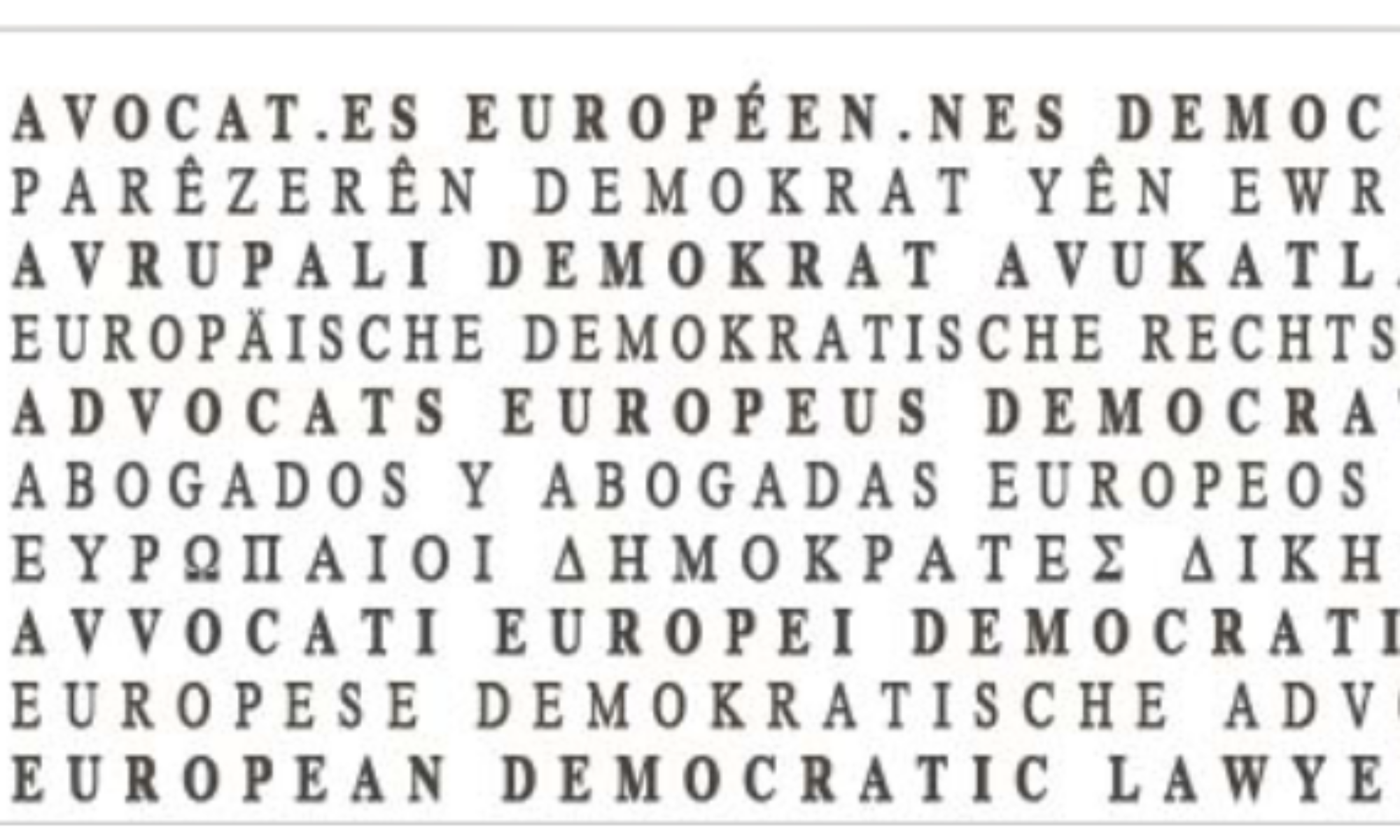Trial is an assault on political opposition and democratic norms before elections
[Istanbul: January 9, 2023] Current efforts to dissolve the second-largest
opposition party in Turkey’s parliament ahead of parliamentary and presidential
elections are the latest in a deeply problematic practice in Turkey of forcing
the closure of political parties, a group of 10 international and local non-governmental
organizations, including European Democratic Lawyers said today. Previous
efforts have violated the rights to freedom of association, assembly, and
expression, and to free and fair elections including the rights of voters to
elect their chosen representatives.
The Constitutional Court is currently being asked to order the closure
of the Peoples’ Democratic Party (HDP), a political party with 56 deputies in
Turkey’s parliament. An indictment against the party seeks to ban 451
politicians and party members from organized political activity or membership
of political parties for a period of five years and forfeiture of the party’s
assets. On January 5, the Constitutional Court agreed to a request by the chief
prosecutor of the Court of Cassation for the interim measure of freezing the party’s
bank accounts containing treasury support which political party groups in
parliament are entitled to receive. On January 10, the chief prosecutor is due
to give an oral presentation of the case against the party to the
Constitutional Court, which the HDP will respond to at a later date before the
court convenes to deliberate and then issue a final ruling.
The 10 organizations on October 11, 2022 submitted a third-party
intervention to the Constitutional Court arguing that arbitrary closure of
political parties violates multiple rights.
“International law guarantees the rights of political parties within the
frame of freedom of association,expression, peaceful assembly, and
views the rights of every citizen to take part in the conduct of public
affairs, to vote and to stand for election as core principles of democracy,”
said Philip Leach of the Turkey Human Rights Litigation Support Project. “The
case before Turkey’s Constitutional Court concerning the possible closure of
the Peoples’ Democratic Party is a fundamental test of whether the court will
abide by international law and respect democratic norms. Closing down a
political party without compelling grounds violates multiple rights and is an
attack on democracy.”
The case before
the Constitutional Court is based on a June 7, 2021 834-page indictment that mainly
asserts the HDP’s activities are carried out in line with the aims of the armed
outlawed Kurdistan Workers’ Party/Kurdistan Communities Union (PKK/KCK). According
to the indictment, there is an “organic” link between the PKK/KCK and the HDP’s
activities which the prosecutor claims support separatism by being “in conflict
with… the indivisible integrity of the State with its territory and nation,” a
violation of article 68/4 of Turkey’s Constitution and provisions in the Law on
Political Parties. The indictment accuses the party’s members and sub-bodies
and organs of having taken part in the commission of crimes of this nature or
encouraged them to be committed or praised these crimes and those who committed
them.
The NGOs argued
in their third-party intervention that the case against the HDP should be seen
in the context of Turkey’s long history of party closures which contrasts
starkly with the practice in other Council of Europe member states and has repeatedly
been found to violate the European Convention on Human Rights.
Since 1982, Turkey’s
Constitutional Court has ordered
the dissolution of 19 political parties out of the 40 cases it has reviewed.
The majority of these have been parties representing the interests of Kurds in
Turkey or leftist parties. The vague and widely drawn prohibition of acting “in
conflict with … the indivisible
integrity of the State with its territory and nation” has been the principal
charge. Three parties have been closed down on the equally vague grounds of acting
“in conflict with… the principles of the democratic and secular republic.” In
2008, President Erdogan’s Justice and Development Party itself narrowly escaped
party closure on the latter grounds.
The European
Court of Human Rights (ECtHR) has found that party closure decisions violated
the European Convention on Human Rights in six out of seven of the cases from
Turkey it has examined.
In its case law essentially
developed out of its rulings on those cases, the ECtHR deems restrictions or
closure of political parties to be exceptional and extreme measures. The court’s
criteria for examining the compliance of a party closure decision with the
European Convention on Human Rights is based on three tenets. The court assesses
whether the closure is prescribed by law, whether it pursues a legitimate aim,
and whether it is necessary in a democratic society and proportionate.
The
NGOs emphasized in their submission that in all the cases of parties
representing the interests of Kurds submitted to the ECtHR, the court found that
peacefully advocating the right to self-determination and recognition of
Kurdish language rights or Kurdish identity were not themselves contrary to the
fundamental principles of democracy, and that party closure violated the right
to association. The ECtHR determined
that in most cases the dissolution of those parties could not
reasonably be said to have met “a pressing social need”.
“The Constitutional Court should view the present case against the HDP in light of the repeated rulings of the European Court of Human Rights finding that closure of political parties in Turkey – in particular those representing the interests of Kurdish voters – violates fundamental rights. The extreme measure of closing down a political party serves to stifle pluralism and limit freedom of political debate, which is at the very core of the concept of a democratic society.”
The NGOs also examine the ECtHR’s recent findings in cases concerning
HDP members, a pattern of abuse of criminal proceedings to silence perceived
opponents and critics of the government and the evidence that the Turkish
government systematically interferes with the judiciary.
The NGOs submitting the third-party intervention to the Constitutional
Court are: ARTICLE 19, the Association of Lawyers for
Liberty (ÖHD), the European Association of Lawyers for Democracy and Human
Rights (ELDH), European Democratic Lawyers (AED), the Human Rights Association
(İHD), Human Rights Watch (HRW), the International Commission of Jurists (ICJ),
the International Federation for Human Rights (FIDH), Rights Initiative
Association, and the Turkey Human Rights Litigation Support Project (TLSP).










